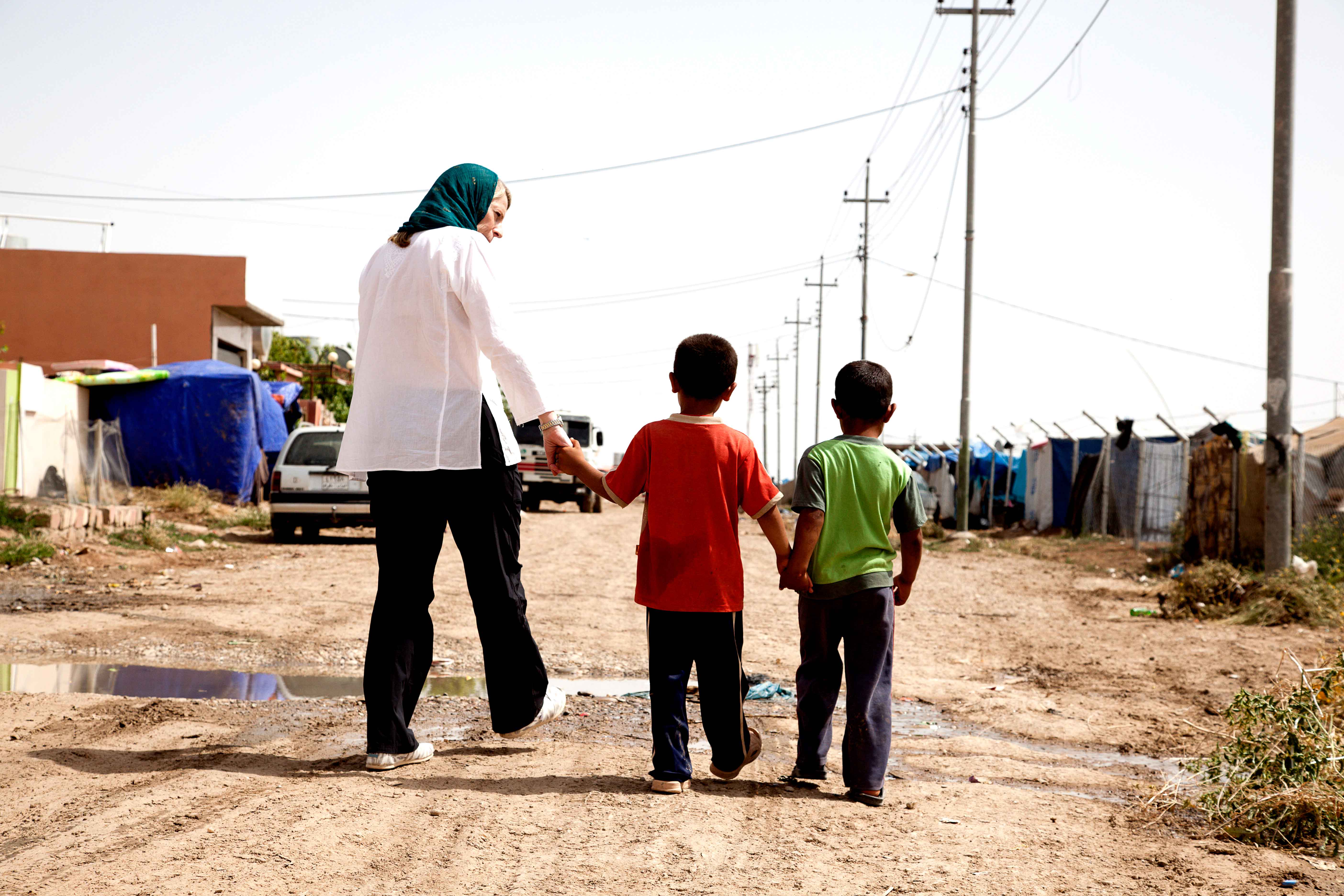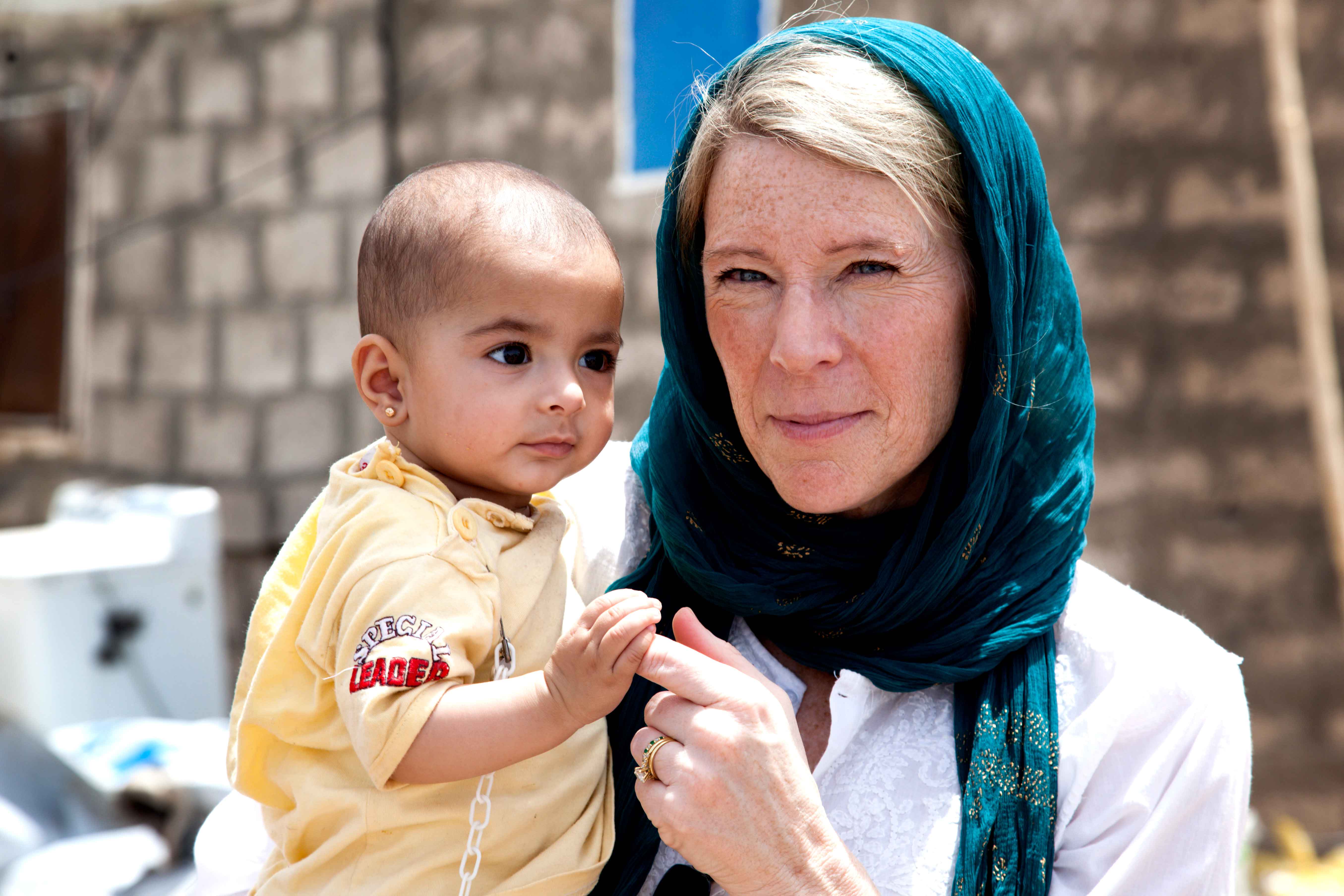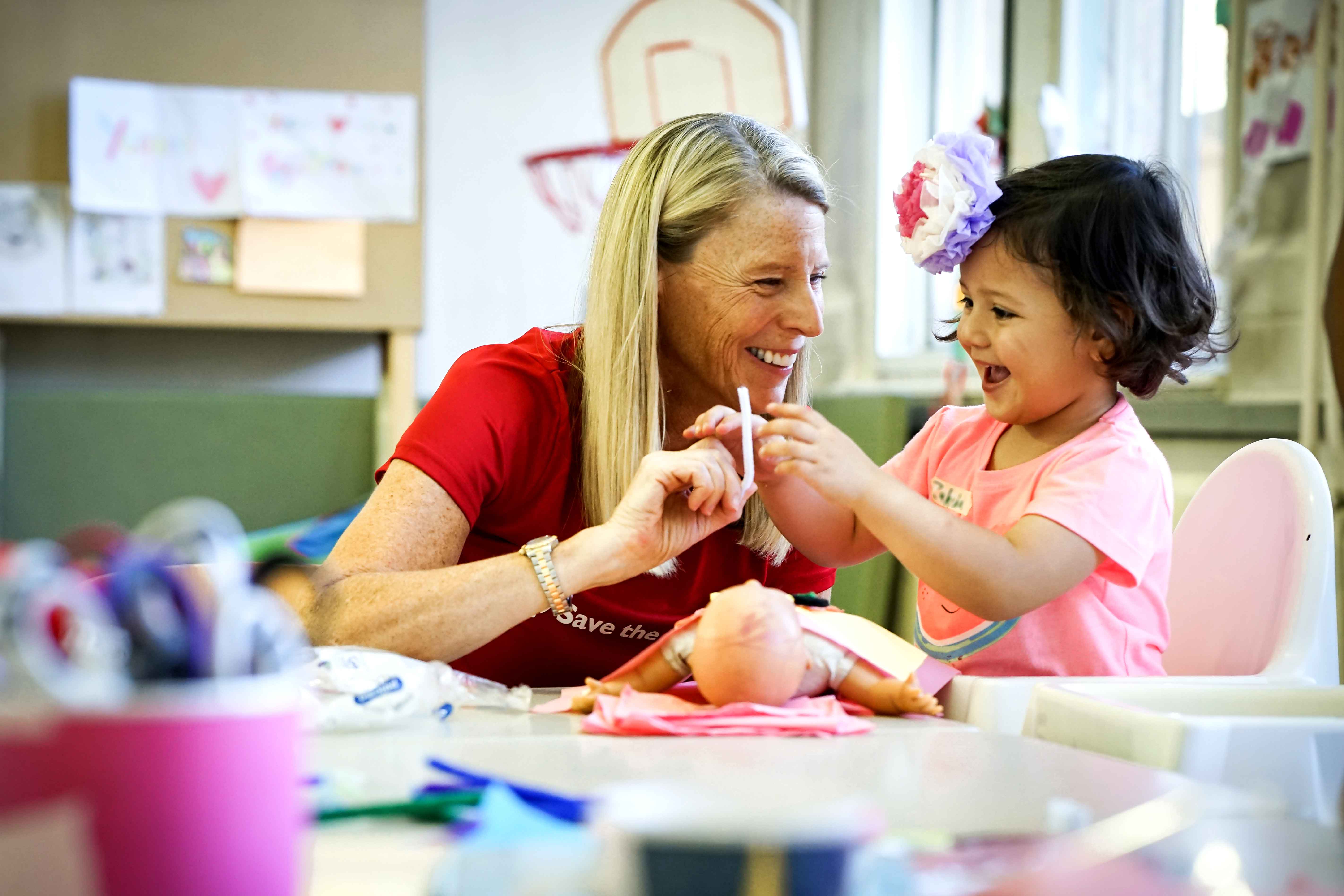Asked to describe what drives her, Carolyn Miles remembers a 15-year-old Syrian refugee who, when Miles asked what he thought his future held, said only, “I don’t think I have a future anymore.”
Miles, an alumna of the University of Virginia’s Darden School of Business, is president and CEO of Save the Children, a role that recently earned her a place among People Magazine’s “25 Women Changing the World.” She met the Syrian boy while visiting Jordan’s Zaatari refugee camp, home to more than 100,000 displaced people. The teen had been in the camp for about a year.
“He told me that he had been in high school in Syria and was a great student,” Miles said. “His parents were a teacher and an engineer and he was really focused on getting his education. But, when I asked him what he thought his future was like now, he said he did not think he had a future anymore.

Above, Miles visits a refugee camp in Northern Iraq, home to many refugees fleeing violence in Syria. (Photo courtesy of Save the Children)
“That is about the worst thing that a kid that age could say to you, and that is what I worry about in this crisis. For Save the Children, that is really what motivates us to do everything that we possibly can for refugee children – to give them the future that they deserve.”
The Syrian refugee crisis has been a major focal point for Save the Children, but it is far from the only program that the organization runs. During Miles’ tenure, Save the Children has more than doubled its reach. It currently serves more than 165 million children in the United States and another 120 countries.
UVA Today spoke with Miles to learn more about her work.
Q. How did you become involved with Save the Children?
A. After Darden, I worked for American Express in New York before being sent to Hong Kong, where two of my three children were born. While traveling Asia with our family, I realized that my kids would have so many opportunities because they were born to parents who, by global standards, were very well-educated and had the means to support them.
A lot of the kids that we met would never have those opportunities. That got me thinking that maybe there was something else I could do to bring the skills I have to bear on this.
When we returned to the United States, I had already decided that I wanted to work in the nonprofit space and I met someone at Save the Children through a fellow Darden alumnus. That was 18 years ago.
Q. What do you see as the biggest challenges facing children in America, and how is your organization working to tackle those?
A. In the U.S., I believe that education is one of the most critical issues – making sure that every child, particularly in poor areas, gets a high-quality education. For us, that really means a focus on making sure that kids can read. If you look at drop-out rates and other statistics, you see that kids who do not learn to read well in their early years, particularly by the time they get toward the end of elementary school, have a very tough time after that. After all, succeeding in other subjects all depends on being able to read.
We have also focused on early-childhood education. On average, a poor child in the U.S. who doesn’t get an opportunity to go to preschool is 18 months behind middle-income peers when they reach kindergarten. So early-childhood education has been a big priority, especially in poor, rural communities.

Q. What are the most urgent needs around the world, especially regarding the refugee crisis?
A. We have been working on the crisis in Syria for about six years now, sad to say. Inside Syria, we are working with local partners to provide basic health care by running maternity hospitals, providing vaccinations for kids and bringing medical supplies to besieged areas. It has been very difficult work; in fact, a maternity hospital we support was just bombed and badly damaged a few weeks ago. It was one of only a few still operating for moms and babies in Aleppo.
In the five countries surrounding Syria – Iraq, Turkey, Egypt, Lebanon and Jordan – there are about 10 million refugees, half of them under the age of 18. There, our work focuses on education – whether getting kids into school, running kindergartens in the refugee camps or providing informal learning for kids who have dropped out of school. We also provide food to tens of thousands of refugee families.
In the last two years, we have also added programs in places like Greece, where there are huge refugee populations, and in countries like Germany, Norway, Sweden and Finland, where we can help families adjust to their new lives.
It has been a huge effort for Save the Children, focused on health care, education and sometimes helping kids have a place to play and just giving them an opportunity to be kids.
Q. What does an average day look like for you?
A. I try to get out and see our programs and meet the kids and families we serve as much as I can. I just got back from India and was in Bangladesh before that. I usually take about 12 trips per year to visit programs, so I am on an airplane a lot.
I also spend a lot of time raising funds and visiting partners. Recently, I visited tech companies on the West Coast, where we have a group of technology companies that we work with, like Google, Facebook and Uber. We have an annual budget of about $700 million and we raise about half of that each year, so it is a big fundraising lift to get the resources we need for children.
Q. What do you love most about your role?
A. My favorite part is going out and seeing the work we do. Sometimes people think that must be depressing, but I always find it super hopeful because you can see what a difference a little bit of help makes. I love meeting the families and the people around the world that we work with. You learn so much about what their lives are like, and also realize that it does not take a whole lot to make a big difference in people’s lives. That is the thing that always strikes me when I am out. It’s more about giving people opportunities and a chance to make a better life. They take it from there, especially when there are kids involved.

Miles said she most enjoys getting out into the field. “I always find it super hopeful because you can see what a difference a little bit of help makes,” she said. (Photo courtesy of Save the Children)
I also love the people I work with. There are fantastic people at Save the Children who are really dedicated to what we do. A lot of them could be doing lots of other things and be making much more money, probably working less, and they have decided to dedicate themselves to this kind of work.
Q. How has your Darden education helped you manage a global nonprofit?
A. Save the Children is a big, global enterprise and you need some of those same skills that you need in running a big, global business. The financial skills have certainly come in handy, as have the interpersonal and organizational behavior skills, learning how to manage and motivate people. I have brought a focus on measurable results to Save the Children, grounded in my business experience. I concentrated on marketing at Darden and now I spend a lot of time marketing what we do. Being able to talk clearly about what we do, the results we have and what we are trying to make happen for kids has certainly helped me.
Q. What advice do you have for students – business or otherwise – hoping to work with nonprofits?
A. I know that there is such a huge interest in the kind of work that Save the Children does. There are a lot of ways to make a difference, whether going into the nonprofit field, donating, volunteering or serving on an organization’s board.
Sometimes, I think people feel that they have to go off and start their own thing. I typically advise them to look at what people are doing and who is already in that space. Think about how you can make the organizations that are already there better. Don’t start something new unless there is a real gap. It is hard to scale new nonprofits and what we really need are people working at a large scale, because the problems that we are trying to solve are really big.
I also think that some of that work could come through social enterprise businesses, which operate for profit but have a social mission. I think that is a huge need right now in the sector.
Media Contact
Article Information
November 14, 2016
/content/darden-alumna-named-among-peoples-25-women-changing-world

